
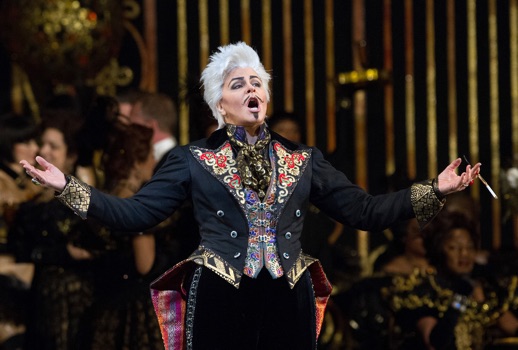
After squirming through his atrocious baroque pastiche The Enchanted Island, I hoped that would be the end of him, but no! A new Fledermaus then arrived, followed by his witless English version of Lehar’s Die Lustige Witwe last season. At least the iffy diction of some of the Fledermaus cast spared us scads of Sams’s doggerel, and—mercifully–the spoken dialogue is by someone else.
I didn’t catch this production in the house during its first season, but I listened to it several times over the airwaves and recall there was way too much dialogue–although playwright Douglas Carter Beane, unlike Sams, can occasionally pop out a pithy punch line. This season’s revival still ran three-and-a-half hours but rarely dragged: even Frosch didn’t wear out his welcome which isn’t always the case. Broadway performer Christopher Fitzgerald, in Met debut, delivered his goofy-jailer-shtick with verve, including some especially funny by-play with prompter Donna Racik.
Yet despite the assistance of Paul Cremo (dramaturg) and Even Cabnet (performance consultant—huh?), Sams’s production was crass and charmless. The scarlet, Klimt-influenced set for the Eisensteins’s residence evoked a louche bordello, but Robert Jones’s golden riot of a ballroom proved more pleasing although it regularly revolved for no reason. I lost count of the number of times the cast bobbed up and down in time with the music and no one much behaved like a recognizable human being.
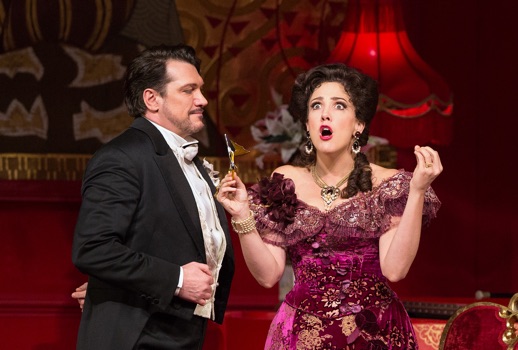
While it would have been interesting for a change to hear a tenor Eisenstein, Toby Spence was nearly always inaudible. He offered a potentially intriguing take on the role, portraying the wandering husband as an overgrown libidinous boy rather than as an aging roué, but the low-lying music didn’t suit his lightweight tenor voice. In the many duets and trios, it just disappeared.
His fellow English colleague Lucy Crowe also vanished but because of illness, so Canadian soprano Mireille Asselin who had debuted as Pousette in last season’s Manon stepped in. Although one wants a slightly larger voice for a house as big as the Met, she proved a lively, charming chambermaid, though less aggressive than some others have been in the role. That modest approach was wise as Betsy Wolfe played her sister Ida as a relentlessly brassy vulgarian.
In her first Orlofsky veteran mezzo Susan Graham effectively underplayed the bored Russian nobleman. Looking dashing in an erstaz-Hvorostovsky shock of white hair, she delivered her dialogue with impeccable “drop-dead” timing and sang with wit and point although the part might now be a tiny bit high for her, particularly in her “Chacun à son gout” strophes. How grand though to have a mezzo again in the role after yet another hopeless countertenor miscasting the last time around.
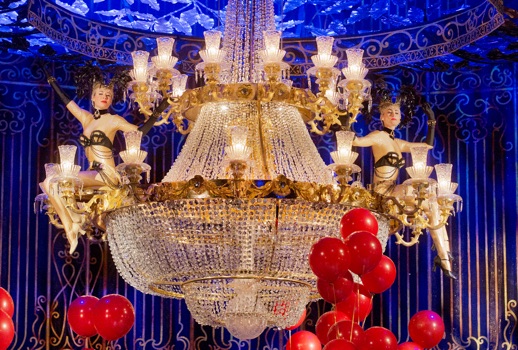
Phillips, another veteran from the premiere cast, was a frustrating Rosalinde. Despite having to execute some of Sams’s most tiresome gags, she managed to retain her dignity even in the ineptly staged “Dieser Anstand” duet with Spence. Vocally, the role should have been a good fit for her, but the middle of the voice sometimes failed to project. Worse, many of her top notes were calamitous: she took down one high B toward the end of the Csárdás and instead of the thrilling high C that should cap the first act we got as one of the most painful yelps I’ve heard at the Met. I remembered that she had also often come to grief vocally during the production’s first season—was there really no one else to take on Rosalinde for this revival?
Although I was among those who doubted that we’d see James Levine in the pit, his presence was a pleasant surprise leading his very first Fledermaus with an infectious élan. The magnificent overture did sound choppy and lacked the expected schwung, but things soon settled down nicely. The music bubbled like the oft-referenced champagne until the magical “Duidu” ensemble which plodded and nearly fall apart. The rest of the performance was shaky at times, suggesting under-rehearsal.
I was shocked to realize that I hadn’t seen Fledermaus at the Met for nearly 30 years, not since the season the Otto Schenk production premiered with Kiri te Kanawa and Hakan Hagegard. I remember that that performance too was less than ideal—operetta probably just doesn’t belong at the Met–and yet I still enjoyed it, as I did much of Friday evening’s ragged ride. Strauss’s music remains ever-bewitching, and I haven’t been able to get all those glamorous waltzes out of my head since!
Photos: Marty Sohl/Metropolitan Opera















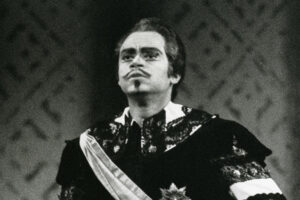
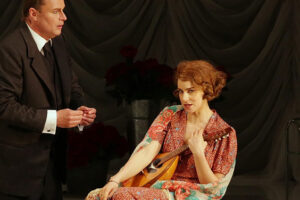
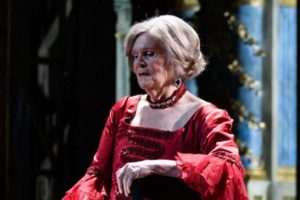






Comments